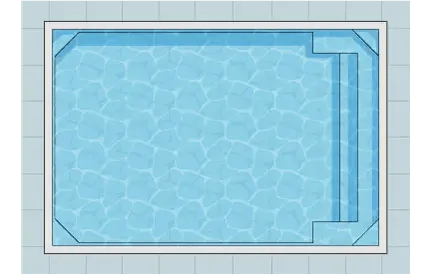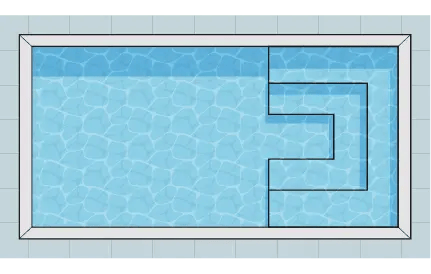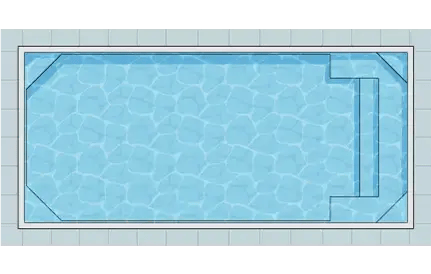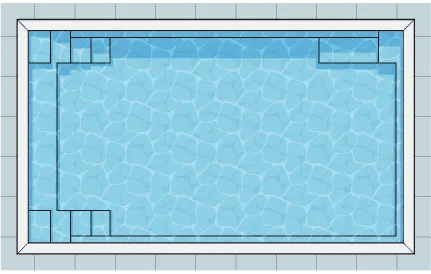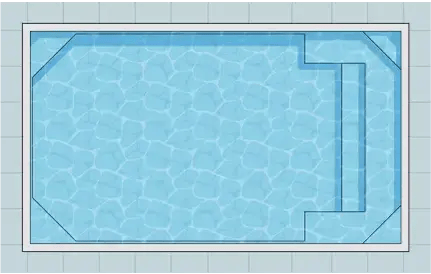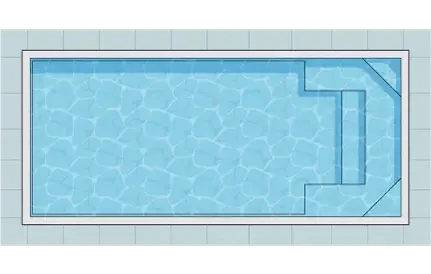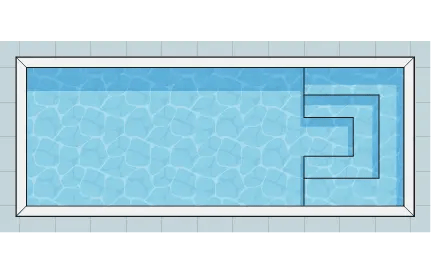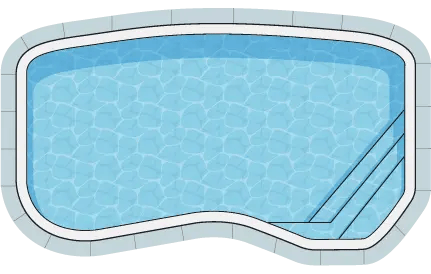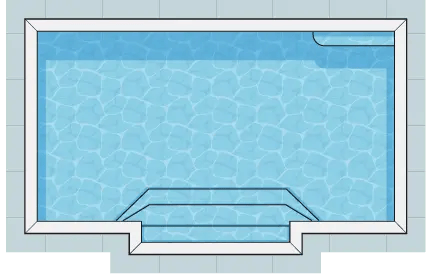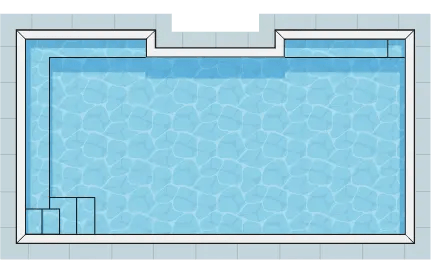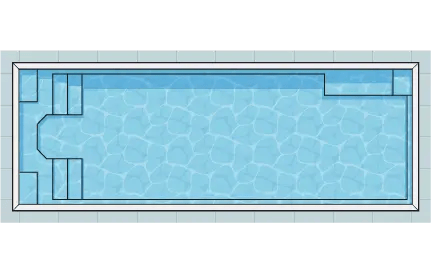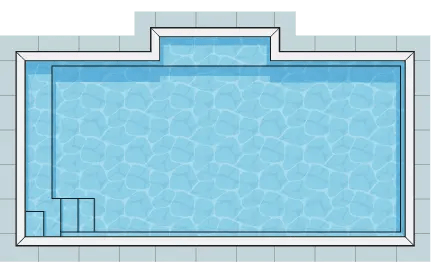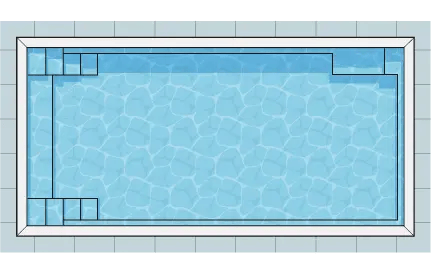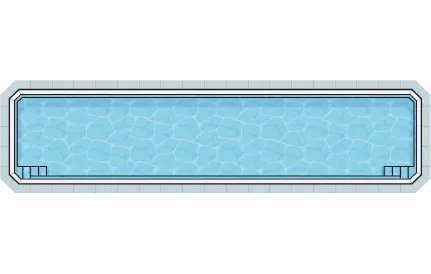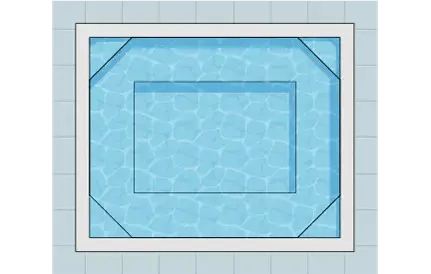Expert Tips and Advice
The Ultimate Fibreglass Pool Buying Guide

Contents
Introduction
The world of swimming pools can often be a confusing place.
Whether it's choosing between a concrete or fibreglass pool, deciding on which filtration to use or which colour will look best, there are so many decisions that need to be made.
You can have a chat with your local pool shop or spend some time on pool forums, but often you will get very mixed advice and sometimes leave feeling more confused than before!
Buying a fibreglass pool can be an exciting investment that can bring years of enjoyment and relaxation to your home. However, there are many factors to consider when making this purchase. In this guide, we'll cover the main topics you will need to help make your pool-buying journey.

What Are the Main Types of Pools?
There are three main types of pools: concrete, vinyl, and fibreglass.
Concrete pools are the most expensive and require the most maintenance. Vinyl pools are less expensive than concrete pools but can be easily damaged. Fibreglass pools are the most affordable, require less maintenance than concrete pools, and are more durable than vinyl pools.
The most common question we receive is, what’s the difference between a fibreglass and a concrete pool?
So, let's delve a little deeper and look at the pros and cons of each.
What Are the Differences Between Fibreglass and Concrete Pools?
Design and Appearance
When it comes to the design and appearance of your pool, both concrete and fibreglass offer versatile, aesthetically pleasing options.
Long gone are the days when fibreglass pools were only available in a handful of colours. Nowadays, the gel coat on modern fibreglass swimming pools comes in an array of colours and shimmer effects that can suit your home and garden.
But if you want a unique design or colour, concrete pools offer unlimited options. There is also a wide variety of surfacing options to choose from, such as pebble or tile.

Pro Tip:
When it comes to design and aesthetics, both types of pools can achieve a beautiful look. While concrete can be architecturally designed to inject your personality into the landscape, modern fibreglass pools have a wide range of popular designs that fit well in most Australian backyards. So, when choosing, it largely depends on your site requirements and preferred aesthetics.
Installation Time
When it comes to installation time, once you have all your permits and are ready to build, it takes approximately:
-
1-3 weeks to install a fibreglass swimming pool
-
Up to 3 months to install a concrete pool
If you want to save money on your fibreglass pool installation, you can choose a company that allows you to opt for a DIY kit, which usually includes the pool shell and delivery cost.
This can save you thousands of dollars because you have the option to self-install or hire a local, independent contractor—as opposed to being locked in a contract with an overpriced company.
Concrete pools are not “installed," they are built onsite. That means that the process will be completed by a pool company and will typically cost 20% more to install than a fibreglass one.
Strength and Durability
When it comes to the longevity of your pool, the factors to consider are strength and durability.
When choosing between the two, it's important to know that while they are both strong and durable options, a well-constructed fibreglass shell is the best option if you want to build a swimming pool on moving clay soil because of its flexibility and higher tensile strength.
Pro Tip:
When deciding, you need to take into account that after installation, a concrete pool typically needs to cure for about a month before it can be used. So, if you are looking for a quick dip straight away, then fibreglass might be a better option. That said, it can be more difficult to install a fibreglass pool shell because you'll need a crane to access the site in order to offload, and contractors must be extra careful when placing it to prevent spider cracks.

Which Type of Pool Is Warmer? Concrete or Fibreglass?
If you’ve been wondering if fibreglass pools are warmer than concrete, the answer is yes.
The material heats up the pool much quicker and holds heat longer than concrete. In addition, fibreglass pools are cheaper to heat than concrete.
They require less energy to heat, and once the ideal temperature is reached, it takes less energy to maintain the temperature.
Pro Tip:
A pool cover is essential for both concrete and fibreglass to help warm up and keep the heat in.
- Fibreglass Pool
- Pros
- Smooth finish, less scratching
- No Mould
- Low maintenance
- Less ongoing labour
- Algae-resistant
- Lower lifetime costs
- Rarely needs resurfacing
- Quick to install
- Easy to look after
- Heat up faster than concrete and retain heat for longer
- Durable and flexible building material
- Cheaper than concrete
- Lower chemical use and thus more environmentally friendly
- Cons
- Shape/size limitations: they are pre-fabricated and can't be custom-made
- Repair: if the shell breaks, you need to replace the whole pool
- Concrete Pool
- Pros
- Flexibility with design: made on-site, your pool design has no limitations
- Aesthetics: there are unlimited options in colours, and the pool surface can be Pebblecrete or a fully tiled interior
- Cons
- Takes longer to install
- Both initial cost and maintenance costs are higher
- Abrasive interior texture
- Susceptible to algae growth
- Can crack if there are earth movements
- Requires more chemicals
Types of Chlorinators
If you're here, it's likely you're well into your research for your dream pool. One of the first challenges is often choosing between traditional chlorine, saltwater, or mineral chlorinator systems.
The question is, which one will work best for you? This is where confusion can set in. What are the main differences between each type?
In recent years, mineral pools and spas have become popular among Australian families due to the health benefits of soaking in magnesium.
Alternatively, saltwater pools have proven to be a more popular option than chlorine pools because they are less expensive to maintain and cause less irritation to the skin and eyes.
Here's what you need to know:
Traditional Chlorine Pools
Red stinging eyes, chlorine smell on your skin, and really needing to wash your hair after a swim.
Ring any bells? Chlorine was once the most popular way of sanitising a pool.
Liquid chlorine was added to the water, and this did the really important job of killing bacteria, stopping algae and making the pool water a safe, clean place to take a dip.
Although liquid chlorine does a fantastic job of sanitising the pool, it comes at a price. When swimming in a pool, you want to have the feeling of swimming in fresh water—not worrying about the water getting into your eyes and irritating your skin. Plus, the red, stinging eyes can really upset children (and, to be fair, adults too!)
So, although liquid chlorine is an effective method to keep your swimming pool safe for swimming, there are more effective ways to produce chlorine these days.
- Chlorine
- Pros
- Cheaper than other methods of sanitising your pool
- Easy to set up
- Cons
- The water is harsh and often leads to red eyes
- The strong smell of chlorine on your skin and hair
- Need to have a shower straight after swimming
Saltwater Pools
Saltwater pools still use chlorine, but it's not like liquid chlorine.
With a saltwater pool, a Saltwater Chlorinator uses salt, which you add to your pool water to create chlorine.
This is still a chlorine pool, but it follows a different process of making chlorine. Most pools will need salt to be added once or twice a year. The chlorinator uses an electrolytic cell that converts the chloride from the salt water into chlorine.
The smell we associate with Chlorine comes from Chloramines, which is a by-product of chlorine. A saltwater chlorinator prevents this smell as it monitors the chlorine output so there aren't fluctuations in the amount of chlorine being generated.
An important factor to consider when looking at the equipment that is supplied with your pool is the size of the Chlorinator. At Swimming Pool Kits Direct, we have pre-selected the correct size chlorinator for each size pool, which is crucial.
If you have a chlorinator that's too small for the size of your pool, then it will have to work too hard to create the correct level of chlorine. Some pool kit companies may offer cheaper kits, but it's likely that their equipment isn't chosen to the same specifications as Swimming Pool Kits Direct—be sure to look at this.
Pro Tip:
Look at the size of the Chlorinator you are being sold is it big enough? It's much better to be oversized than undersized.
- Saltwater
- Pros
- Water is less harsh than traditional chlorine pools, so it's gentler on the skin
- The level of salt is very low, so it doesn't taste salty
- Adding pool-grade salt is safer than handling chlorine granules or liquid chlorine
- The salt is continually recycled into the chlorinator and out again, so you only need to add it twice a year
- Pool-grade salt is cheaper to buy than chlorine
- The chlorinator
- Less hands-on than chlorine as the chlorinator is doing the work with no manual adding of chlorine
- Chlorine levels stay consistent, so less chance of algae or cloudy water
- Cost-effective, one $10kg is about $10
- Cons
- You need to buy a Chlorinator
- The Chlorinator needs to be maintained
- Still need to regularly test your pool water (you can take a sample to your local pool shop or use the test strips supplied in your SPKD package)
- Can corrode pool equipment over time
Mineral Pools
Also known as Magnesium pools, the Mineral pool has exploded in popularity, and it's easy to see why.
Essentially, the minerals are used the same way as the salt in a saltwater pool. However, due to the magnesium content, a mineral pool requires 40% less chlorine than a saltwater pool.
In the initial set-up of a new pool, you will be given the correct number of magnesium bags to add to your pool water.
Here at Swimming Pool Kits Direct, we've chosen to include a Chlorinator that can be used for saltwater or minerals. This is a premium product and one that sets our packages apart!
We use Phoenix Oceania Mineral Essence which comprises of Salt from the Murray River and Magnesium from the Dead Sea.
Phoenix Oceania has also added a small percentage of citric acid to prevent any staining of your pool. The feel of the water from a mineral pool is incredible, and you really notice the difference.
The water is silky, and the benefits of Magnesium for your body have been well researched; there's a reason Epsom Salt is recommended to relax the muscles and aid in the relief of sore joints. We love how a mineral pool not only feels great but has health benefits too.
- Mineral
- Pros
- Silky soft water
- Little maintenance
- No chlorine smell
- Requires 40% less chlorine
- Phoenix Oceania uses Australian salt from the Murray River
- Only have to add a couple of bags a year
- Cons
- Costly initial setup; one 10kg bag is about $40
- Still has a small % of chlorine in the pool
What Is In a Pool Filtration System
So now we’ve looked at what types of pools you can buy and what to put in them, but how does a pool work? For starters, both concrete and fibreglass pools need a filtration system.

Sparkling, clear crystal waters on a hot sunny day.
That’s exactly how you want your pool to look, right? Well, in order to get that picture-perfect setup, the most important part of your pool will probably be sitting out of sight—your filtration equipment.
This is the engine of your pool and is something you need to take some time to look into. The exciting part of buying a pool is choosing the fibreglass shell shape, picking a colour and getting stuck into landscape design.
However, the filtration equipment is what's going to keep your pool looking like the tropical oasis you had imagined.
What is the Filtration Equipment?
Every pool, whether it’s a fibreglass pool or a concrete pool, will need a pump, filter, and chlorinator.
The pump is the motor of the swimming pool filtration system. It's responsible for circulating the water through the filter and back into the pool. Water is pulled through the skimmer box at the end of the pool and is then pushed through the pump and into the filter.
It's important to keep the pool water circulating so debris can be removed and the water can stay clean—no one wants their beautiful new pool to turn into a stagnant swamp!
Types of Filters
The filter is the component that removes dirt, debris, and other contaminants from the pool water.
Media Filters
The media filter is sometimes referred to as a sand filter, as it previously used sand as the filtering substance; however, it's more common now to use glass.
Glass is SPKD’s preferred substance as it is not only recyclable but filters out smaller particles from your water.
Media filters use pressure to clean the water. Water is forced through the sand/glass, and the particles are trapped while the clean water is returned to the pool.
Media filters do require you to backwash each month; you do this by moving the top-mount valve of the filter into backwash mode, but be sure you're connected to a stormwater drain. The reason backwashing is required is to clean the filter itself and the glass product that is inside.
Cartridge Filters
A cartridge filter is a cylinder that contains a pleated cartridge made of synthetic fibres used to filter the water.
Cartridge Filters are a great product if you have a small plunge pool or are concerned about water loss in your swimming pool.
Another great reason for using a cartridge filter is if you are either on acreage or do not have access to your stormwater drain because cartridge filters do not require backwashing. Instead, once per month, you go out and rinse off the cartridge with a hose, then pop the cartridge back into the canister, and you are ready to swim again!
It should not take you more than 10 minutes to rinse off the cartridge as part of your ongoing pool maintenance each month. You can replace the inner cartridges when required, but with regular cleaning, they should last 3-5 years.
Swimming Pool Kits Direct pools include a: pump, filter, and chlorinator.
Types of Pumps
Single-Speed
Single-speed pumps have been used for many years in swimming pool filtration systems. They operate at a fixed speed, typically at a high RPM (revolutions per minute).
These pumps can not be adjusted, so will always operate at one constant speed. Most people will run their pump on a timer, so once it's set up, they generally won't need to be touched.
One of the main advantages is the initial price; these pumps are the cheapest pumps to buy. However, it's important to note that while single-speed pumps are effective at circulating the water and filtering debris, they consume a lot of energy because they operate at a fixed high speed, resulting in high utility bills for pool owners.
In addition, the high RPMs of single-speed pumps can cause excess wear and tear on the pump, shortening its lifespan and increasing the need for repairs or replacements.
Variable-Speed
Variable-speed pumps are becoming an increasingly popular option due to their energy-saving capabilities. The pump is designed to adjust its speed to match the demand for flow rather than running at a fixed speed regardless of demand like a single-speed pump.
At Swimming Pool Kits Direct, we have the Oceanix Inverpro Eco Pump, which is a market-leading pump packed full of innovative features.
The pump runs intelligently between 30-100% capacity to fulfil different applications like filtration and backwash, reduces the sound level more than 30 times and saves energy by up to 90%.

- Variable Speed Pumps
- Positives
- Energy Efficiency: Variable-speed pumps save energy by adjusting their speed to match the required flow rate, unlike traditional fixed-speed pumps which run at full speed constantly.
- Longer Lifespan: Because variable-speed pumps run at a lower speed and have less wear and tear on their components, they tend to last longer than traditional pumps.
- Improved Performance: By matching the flow rate to the demand, variable-speed pumps can provide more consistent and accurate pressure and flow, leading to better system performance.
- Reduced Noise: Variable-speed pumps are often quieter than traditional pumps, particularly when running at lower speeds.
- Negatives
- Higher Upfront Cost: Variable-speed pumps are generally more expensive to purchase than traditional fixed-speed pumps, although the energy savings they provide can offset this cost over time.
Choosing a Pool Colour
Now we’re at the fun part! Choosing your pool colour means you’re so close to getting your dream pool! However, it can be a daunting decision, as it will be a colour that you will have for many years.
It's important to note that the pool's colour will appear different when the water is in the pool. This is due to the reflection of the water, which can alter the appearance. For example, a pool with a blue finish may appear darker when water is added, whereas a white pool will naturally have a light aqua-blue colour.
Another consideration is the temperature of your local climate. Darker pool colours tend to absorb more heat from the sun, which can make the water warmer. This can be beneficial in cooler climates or for those who want to extend their swimming season. However, in hotter climates, a darker pool colour can make the water too warm, so a lighter colour may be preferred.
Ultimately, when choosing a pool colour, it's important to consider your personal preferences, the surrounding environment, and any practical considerations such as the climate.
By taking the time to choose, you can create a beautiful and inviting outdoor space that you'll enjoy for years to come.

Heating System
To extend the longevity of your swimming pool and get the most use out of it, we recommend a few additional accessories worth investing in.
If you're looking to use your pool often, you should definitely check out heaters, pool covers, and pool cleaners. These are the three things you need to make sure your pool stays clean and comfortable for the long haul.

Types of Heating Systems
There are three main types of heating systems: solar, electric, and gas.
- Solar
- Solar heating systems are environmentally friendly and a cost-effective option.
- Solar heating systems use a series of small black tubes, which are usually mounted on the roof of your house. The pool water is pumped through these tubes, heated by the sun, and then returned to the pool. Note that a separate pump will be required to run this system.
- Electric
- Electric heating systems are the preferred heating system for most people, as they are efficient and can be used year-round.
- Electric heating systems use an electric heat pump to extract heat from the air and transfer it to the water.
- Gas
- Gas heating systems are fast and efficient, but they can be expensive to run.
- Gas heating systems work by pumping the pool water through a heat exchanger.
Pool Covers
Pool covers are an essential accessory for any pool.
They help to keep the water clean and prevent evaporation, which can help to save on water and heating costs. There are three main types of pool covers: solar covers, safety covers, and automatic covers.

- Solar Covers
- Solar covers are designed to warm the water by trapping the sun's heat.
- They are easy to use and can be removed quickly, but they do not provide any safety benefits. The covers we sell at Swimming Pool Kits Direct are the Daisy pool covers and can raise the pool temperature by 8 degrees.
- Automatic Covers
- These covers are designed to be opened and closed automatically using a motorised system.
- They are convenient to use and are great if you can install them when building work is taking place, as they can be placed out of sight under a deck or in the concrete.
Pool Cleaners
Keeping your pool clean is important to prevent unwanted damage and added costs.
There are a lot of different types of pool cleaners available, and the one you select is dependent on factors such as location, cost, and personal preference. At Swimming Pool Kits Direct, we offer a suction cleaner and three different robot cleaners.

- Suction Cleaners
- A pool suction cleaner is a device that is designed to clean the bottom of a swimming pool by using the suction created by the pool's filtration system.
- This system works by plugging the cleaner hose into the vacuum plate in the skimmer box. It’s a simple and effective system that has been used for a long time! Pool suction cleaners are a popular option, as they are easy to use, require little maintenance, and are generally more affordable than other types of pool cleaners. However, one negative is that due to the unit being plugged into the vacuum plate, there is no surface skimming of the water. This can be problematic for pools in areas with a lot of leaf debris.
- Robot Cleaners
- Robot cleaners for swimming pools are autonomous devices that are designed to clean the bottom, walls, and waterline of a swimming pool.
- They are powered by an electric motor and have a series of brushes and scrubbers that clean the surface of the pool. Robot cleaners have their own inbuilt pump and collection basket. The cleaner is placed in the pool and moves around using a combination of sensors, algorithms, and programming to map the pool's shape and navigate around obstacles. Robot cleaners are highly effective at removing debris, but the collection basket must be emptied regularly for efficiency. While robot cleaners are generally more expensive than other types of pool cleaners, they are a popular choice for pool owners who want a hassle-free and effective way to clean their pool.







